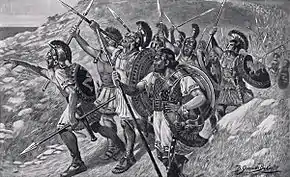Thalatta! Thalatta!
Thálatta! Thálatta! (Greek: Θάλαττα! θάλαττα! — "The Sea! The Sea!") was the shouting of joy when the roaming 10,000 Greeks saw Euxeinos Pontos (the Black Sea) from Mount Theches (Θήχης) in Trebizond, after participating in Cyrus the Younger's failed march against the Persian Empire in the year 401 BC. The mountain was only a five-day march away from the friendly coastal city Trapezus. The story is told by Xenophon in his Anabasis.[1]

Linguistics
Thálatta (θάλαττα, pronounced [tʰálatta]) is the Attic form of the word. In Ionic, Doric, Koine, Byzantine, and Modern Greek it is thálassa (θάλασσα).
Legacy
The cry is mentioned by the narrator of Frederick Amadeus Malleson's translation of Jules Verne's Journey to the Center of the Earth,[2] when the titular expedition discovers an underground ocean. It is absent from the original French work.[3]
The phrase appears in Book 1 of James Joyce's 1922 novel Ulysses when Buck Mulligan, looking out over Dublin Bay, says to Stephen Dedalus, "God! ... Isn't the sea what Algy calls it: a great sweet mother? The snotgreen sea. The scrotumtightening sea. Epi oinopa ponton. Ah, Dedalus, the Greeks! I must teach you. You must read them in the original. Thalatta! Thalatta! She is our great sweet mother. Come and look." In Book 18, Molly Bloom echoes the phrase in the closing moments of her monologue: "and O that awful deepdown torrent O and the sea the sea crimson sometimes like fire."[4]
Iris Murdoch wrote a novel called The Sea, The Sea, which won the Booker Prize in 1978.[5]
Walter Hill's 1979 film The Warriors, which contains many parallels with Anabasis, references this quotation near the end, as the titular gang stands on a Coney Island beach and their leader (Michael Beck) comments, "When we see the ocean, we figure we're home."
The shout briefly appears in Lionel Dunsterville's memoir The Adventures of Dunsterforce (1920), when, after passing Rasht, Dunsterville's small force reaches the Caspian Sea:
It was about an hour before sunset that the proximity of the sea was announced by the sand dunes, a moment later—Θάλασσα! θάλασσα!—the blue waters of the Caspian became visible in the distance, and we were soon in the outskirts of the Kazian settlement.[6]
See also
References
| Wikimedia Commons has media related to Thalatta! Thalatta!. |
- Xenophon. "Anabasis: Book 4, Chapter 7, Section 24". Perseus Project. Tufts University. Retrieved 17 September 2013.
- Journey to the Center of the Earth, translated by Frederick Amadeus Malleson
- Verne, Jules (1864). Voyage au centre de la Terre (1st ed.). Paris: Hetzel. p. 220. Retrieved 27 December 2020.
- Joyce, James (1922). Ulysses (Gabler ed.). New York: Vintage, 1986. pp. 4–5, 643.
- Murdoch, Iris (1978). The Sea, The Sea. Chatto & Windus.
- Dunsterville, Lionel (1920). The Adventures of Dunsterforce.